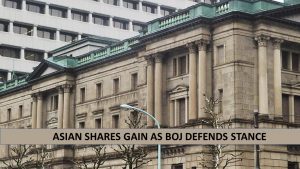Asian shares gain as BOJ defends stance

Japanese shares led gains in Asian stocks on Tuesday as the Bank of Japan (BOJ) defended its ultra-easy monetary policy stance, while oil slid on fears of lower demand from China as Shanghai shut down to combat a COVID-19 surge.
Japan’s Nikkei gained 1.1%, while MSCI’s broadest index of Asia-Pacific shares outside Japan rose 0.67%, also helped by the first direct talks between negotiators in the Russia-Ukraine conflict in more than two weeks, even as fighting raged on.
Futures pointed to a higher open in European markets. EUROSTOXX 50 futures jumped 1.1% and FTSE futures rose 0.6%. U.S. S&P 500 futures were more muted, up 0.17%.
The BOJ vowed to keep monetary policy ultra-loose, offering to buy unlimited amounts of 10-year government bonds to prevent yields in Japan from rising as they are doing elsewhere following U.S. Federal Reserve’s moves to hike interest rates in the face of mounting inflationary pressures.
The central bank was finding it tough going, however, as the 10-year JGB yield stood at 0.245% hovering near the BOJ’s implicit 0.25% cap.
“Excess volatility and disorderly currency moves could hurt economic and financial stability,” Japan’s top currency diplomat Masato Kanda told reporters on Tuesday, confirming the resolve of Japan and the United States to closely communicate on exchange-rate issues.
The BOJ’s intervention raised the stakes for policymakers in the world’s third-largest economy as Japan tries to navigate the rising cost of imports from a weakening currency and global fallout of the Ukraine war.
The bond market intervention is in line with an announcement the BOJ made on Monday to offer unlimited bond buying from Tuesday to Thursday to keep the 10-year Japanese government bond (JGB) yield from rising above an implicit 0.25% cap it sets around its 0% target.
The BOJ made two offers on Tuesday, after the first in the morning failed to push down yields much. Combined, the offers drew bids worth 528.6 billion yen ($4.28 billion).
Meanwhile, oil prices weakened as traders expected China’s economy to suffer in the country’s fight against renewed outbreaks of COVID-19
.The snap lockdown, announced by the local government late on Sunday, will split China’s most populous city roughly along the Huangpu River for nine days to allow for “staggered” testing by healthcare workers in white hazmat suits.
It is the biggest COVID-related disruption to hit Shanghai and sent prices of commodities including oil and copper lower on fears that any further curbs could hurt demand in China, the world’s second-largest economy.
“Certainly, commodity markets will not be comfortable in the short term with China shutting down,” Lo said. Many observers estimate less than 5% growth this year for the world’s second-biggest economy, he said, a view he rated as “too pessimistic” given expectations for stronger stimulus measures.
Chinese blue chips lost 0.43%, while Hong Kong’s Hang Seng index rose 0.76%.
Yields on U.S. benchmark 10-year treasury notes were steady at 2.4716%, little changed on the day due to a pause in the sharp sell-off seen in recent days.
However, two-year yields rose as far as 8.2 basis points to a nearly three-year peak of 2.421%, causing the gap between two- and 10-year yields to narrow to its tightest since early 2020.
Spot gold dropped 0.1% to $1,922.24 an ounce.
Important Note: The information found on Ausprime platform is intended only to be informative, is not advice nor a recommendation, nor research, or a record of our trading prices, or an offer of, or solicitation for a transaction in any financial instrument and thus should not be treated as such. The information provided does not include any specific investment objectives, financial situation and needs of any specific person who may receive it. The past performance is not a reliable indicator of future performance and/or results. Past Performance or Forward-looking scenarios are not a guarantee of future performance. Actual results may differ materially from those anticipated in forward-looking or past performance statement
